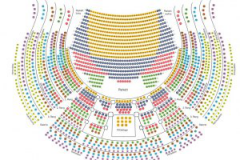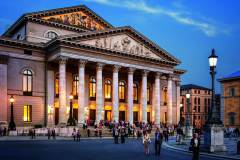Macbeth
Mo | Tu | We | Th | Fr | Sa | Su |
Melodramma in four acts - second version (1865)
recommended for 16 years and older
Synopsis
Act 1
Macbeth and Banquo meet witches, who greet Macbeth as the Thane of Cawdor and future king of Scotland. They prophesy to Banquo that he will be the father of kings. When messengers of King Duncan bring news of the Thane of Cawdor’s execution and announce that Macbeth has been chosen to succeed him, one of the prophecies has already come true.
In a letter from her husband Lady Macbeth learns of the witches’ predictions, and she urges him to stop at nothing, even murder, on his path to power. That same night Macbeth kills King Duncan, but shrinks from leaving the murder weapon beside the sleeping guards in order to incriminate them. Lady Macbeth thus carries out this part of the plan herself. At daybreak, the murder is discovered. Macbeth and his wife join in with the chorus of mourners.
Act 2
Macbeth is the new king. He is disturbed by the prophecy about Banquo’s heirs becoming kings and hires murderers to kill Banquo and his son Fleance. That night, Banquo is seized by dark forebodings.
Macbeth and his wife organize a large feast, and the king announces a drinking song of the queen. Macbeth is informed of the murder of Banquo and Fleance’s escape, and shortly afterwards Banquo’s ghost appears to him. Macbeth’s apparent insanity causes a commotion among the guests at the feast. Lady Macbeth questions Macbeth’s bravery and calls him a weakling. Macduff senses the truth and leaves the feast in order to bring Malcolm, Duncan’s son who fled, back to Scotland.
Act 3
Macbeth again consults the witches, who are busy with a horrible “nameless work”. They therefore send apparitions to answer Macbeth’s questions. The first warns the king about Macduff. The second encourages his murderousness, saying that “no man of woman born” can harm him. The third apparition is a crowned child who predicts that Macbeth will remain invincible “until he sees Birnam Wood come towards him”. Finally Macbeth manages
to make out eight kings, the last of whom looks like Banquo. Macbeth faints, and is reawakened by dancing spirits of the air.
Lady Macbeth hears about the latest prophecies from her husband. The royal couple become increasingly murderous and decide to burn down Macduff’s castle and have Banquo’s son killed.
Act 4
Scottish refugees lament the suffering of their country, which has become a tomb for its children. Macduff mourns his wife and children, who have been murdered by Macbeth. Malcolm meets English soldiers in Birnam Wood, not far from Macbeth’s castle, and camouflages his army using branches and leaves from the wood.
The chambermaid and a doctor witness Lady -Macbeth walking in her sleep and talking about the crimes she has committed.
Macbeth is plucking up his courage for the coming battle, and news of his wife’s death does little to deter him. He is informed that Birnam Wood is moving towards his castle. In a fierce fight, Macduff kills Macbeth. Again the prophecy comes true, because Macduff was “from his mother’s womb untimely ripp’d”. Malcolm is joyfully greeted as the new king of Scotland.
Program and cast
Composer Giuseppe Verdi. Libretto by Francesco Maria Piave after William Shakespeare.
In Italian. With surtitles in German and English.
Duration approximately 3 hours 15 minutes
Conductor: Andrea Battistoni
Production: Martin Kušej
Set Design: Martin Zehetgruber
Costume Design: Werner Fritz
Lighting: Reinhard Traub
Choruses: Christoph Heil
Dramaturgy: Sebastian Huber, Olaf A. Schmitt
Macbeth: Amartuvshin Enkhbat
Banco: Roberto Tagliavini
Lady Macbeth: Saioa Hernández
Dama di Lady Macbeth: Nontobeko Bhengu
Macduff: SeokJong Baek
Malcolm: Samuel Stopford
Arzt: Martin Snell
Diener: Christian Rieger
Mörder: Christian Rieger
Erscheinung 1: Bruno Khouri
Erscheinung 2: Iana Aivazian
Erscheinung 3: Solist(en) des Tölzer Knabenchors
Bayerisches Staatsorchester
Chorus of the Bayerische Staatsoper
National Theatre Munich
The National Theatre Munich (German: Nationaltheater München) is an opera house in Max-Joseph-Platz in Munich, Germany. It is the home of the Bavarian State Opera and the Bayerisches Staatsballett(Bavarian State Ballet).
The Bavarian State Opera also performs in the Prinzregententheater, which opened in 1901 and, like the Bayreuth Festspielhaus, is built to Richard Wagner's specifications, and in the Cuvilliés Theatre at the Residenz, constructed in 1751–1753 and described by Thierry Beauvert as "a Rococo gem".
The Nationaltheater is very easy to get to both by car and by MVV public transportation.
By MVV public transportation
S-Bahn: S 1 - 8 Marienplatz
U-Bahn: U 3, 6 Marienplatz, U 3 - 6 Odeonsplatz
Bus: 52, 131 Marienplatz, 100 Odeonsplatz
Straßenbahn: 19 Nationaltheater
On the day of the performance, holders of regular tickets are entitled to use public transport provided by the Münchner Verkehrsverbund (MVV). This service starts at 3 pm respectively three hours before the performance commences and ends with the closing hour of the MVV.
By Car
Take the Altstadt-Ring to Maximilianstraße.
Parking garage Max-Joseph-Platz: open Monday to Sunday from 6:00 A.M. to 2:00 A.M.
You can take advantage of the special theatre parking fee of Euro 10,- from 6:00 P.M. to 8:00 A.M. by presenting your admission tickets.

 EN
EN DE
DE IT
IT FR
FR ES
ES RU
RU JP
JP RO
RO
 Seating plan
Seating plan 

